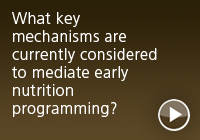Mechanistic studies in EarlyNutrition will investigate the causative pathways leading to programming of obesity and associated disorders that have arisen from influences of the early life nutritional environment. This approach includes a range of laboratory based studies of human samples and investigations in animal models.
Themeleader:
Professor Lucilla Poston, Head of the KCL Division of Women’s Health. She is a member of Council for the Society for the Developmental Origins of Heath and Disease (DOHaD) and a member of GONET, an international network of clinical trialists in obstetrics. She sits on the Academic Board of the Royal College of Obstetricians and Gynecologists (RCOG), Chairs the RCOG Maternal Medicine Clinical Study Group and is President of the RCOG Blair Bell Research Society. She was recently elected a Fellow of the Academy of Medical Sciences.
King’s College London (KCL) contributes to several Workpackages with its expertise in animal studies and intervention studies in humans.
The long-term outcomes of early programming as observed through observational studies on individuals followed throughout childhood, adolescence and adulthood.
Themeleader:
Keith Godfrey BM, PhD, FRCP is Professor of Epidemiology & Human Development at the MRC Lifecourse Epidemiology Unit at the University of Southampton, Director of the Centre for Developmental Origins of Health & Disease and an Honorary Consultant within Southampton University Hospitals NHS Trust. Professor Godfrey’s other appointments include Trustee of the UK registered charity the International Society for the Developmental Origins of Health and Disease, and Deputy Director of the National Institute for Health Research Southampton Nutrition Biomedical Research Unit. His research is defining measures to improve the early growth and development of children, thereby improving their lifelong health.
University of Southampton (Southampton) contributes the SWS cohort to Theme 2 Observational Studies. In addition contributions are planned to Workpackage Epigenetics and Implementation of recommendations

The randomised controlled trials in EarlyNutrition investigate whether growth and risk of obesity and associated diseases in children can be influenced by specific prenatal and early postnatal interventions. Interventions in pregnancy focus on low glycaemic diets and on increased physical activity of the mothers. In the postnatal trials the glycaemic index and protein component of the diet are studied. The trials are also designed to characterise metabolomic and epigenetic markers in maternal and infant biosamples to provide mechanistic insight, and information on the efficacy of the interventions.
Themeleader: Dr. Hans Demmelmair
The University of Munich (LMU) serves also as coordinator for this project.

The consolidation of scientific evidence, the dissemination of information to stakeholders, and the translation of evidence into practical approaches that address the problem of obesity as it relates to early nutrition programming.
Themeleader:
The research experience of Prof. H. Szajewska includes designing, conducting, and analysing randomised controlled trials and systematic reviews/meta-analyses, leading to numerous publications in peer-reviewed journals and chapters in books. She has broad interests in paediatric nutrition, but her research focuses on probiotics and prebiotics, the effects of early dietary interventions to reduce the development of allergy, and diarrhoeal diseases.
The Medical University of Warsaw (MUW) will perform the reviews and meta-analyses.

The management of data and research infrastructure in order to maintain a high quality of research integrity and support the exchange of pertinent information.
Themeleader:
Prof Gernot Desoye, PhD, is research director at the Clinic of Obstetrics and co-ordinator of the key research topic: "Reproduction and Pregnancy" at MUG. He leads a research team focusing on effects of maternal nutrition, obesity and diabetes on placental development and function and how this affects the foetus.
The Medical University of Graz (MUG)contributes with its expertise in sample collection from various cohorts and their biochemical/morphologic analyses.

EarlyNutrition involves a large number of research staff from many disciplines with different levels of experience, from PhD students to senior staff and department heads, as well as administrative staff with different backgrounds. Experience from previous projects shows that this 'mixed group' scenario offers enormous opportunities for fruitful and creative interaction, with exchange of ideas and development of innovative concepts.
Themeleader:
The EarlyNutrition project management team headed by Dr. Brigitte Brands will support the coordinator Prof. Koletzko with an effective and efficient project management structure. Formal processes of project controlling, budgeting and reporting need to run smoothly in order to provide the necessary framework for the project’s research work programme and to ensure a successful implementation of this large research project. Managing the consortium and periodic reporting, acting as the communication channel within the consortium and with the European Commission and organising bi-annual project meetings and trainings within EarlyNutrition are core tasks of the Project Management Team.
The University of Munich (LMU) serves also as coordinator for this project.



































